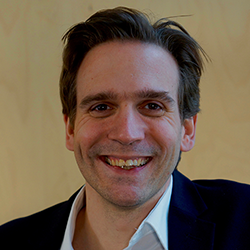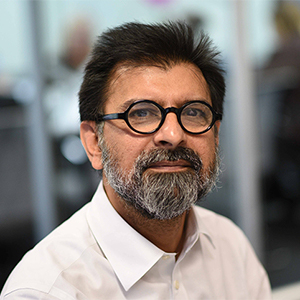Health Innovation East’s new board member Professor Michael Hornberger reflects on the untapped potential of citizen science and his role in strengthening the relationship between academia and the rest of the innovation community.
I’m excited to have joined the Health Innovation East Board as I see so much potential in our role in creating stronger connections across healthcare and research. I’m proud to help give academia a strong voice on the board and provide insight into how we can support the development and rollout of healthcare innovation in our region.
Academia is inherently innovative. We work on the cusp of new discoveries and have to constantly review our methods to ensure we are making the most of technological advancements. But we can’t do so in isolation, which is why partnerships are so vital to ensuring research can deliver patient impact.
Academia has long benefitted from access to technologies and resources within the private sector, whilst partnering with charities can help you find engaged advocates and add validity through the insight of patient and public involvement. However, with the proliferation of mobile technology, there’s potential to gather huge amounts of rich data through enlisting the wider public as citizen scientists.
As a professor of applied dementia research at the Norwich Medical School, University of East Anglia, my focus is on improving diagnosis, disease progression tracking and symptom management in dementia. As with many conditions, there is a focus on how we can personalise medicine to individual patients to get the most effective treatment as early as possible.
An inherent contradiction in personalised medicine is that you need a huge amount of data from the wider population to stratify treatments for the individual. Traditional studies often simply don’t have enough participants. With the public more connected than ever before through mobile technology, there’s a huge opportunity to partner with the public as citizen scientists. Just this year we have seen over 3.5m people sign up for the COVID Symptom Study using an app on their phone to aid research into the coronavirus by reporting their health daily.
In 2016, with support from University College London, Deutsche Telekom and Alzheimer’s Research UK, my team and I launched Sea Hero Quest, a mobile phone adventure game. Through the game, our players built the largest ever crowd-sourced database on human spatial navigation to help us understand how our brains navigate space – which can be the first sign of dementia.
We already have exciting new insights from the data of 4.5m players’ data gathered from the game, which we’ve anonymised and kept open access to ensure as many researchers as possible could benefit. It also helped players to understand more about dementia and research, which will be essential to running similar opt-in experiments in the future. By being clear why their data was important and how it would be used, we’ve turned gamers into research advocates.
In the age of the Internet of Things, citizen science could be invaluable to healthcare research and resulting innovations. Progress in treating mental health, cancer, rare diseases and an ageing population will rely basing solutions on insights from research conducted in partnership with patients and the public.
Citizens, academia, health services and industry will achieve more working together than they will in isolation. That’s why I’m delighted to have joined the Health Innovation East Board – there’s an exciting vision based on convening the healthcare innovation community to develop ideas to turn them into patient impact. There are so many exciting things happening and I will be proud to help shape the AHSN’s strategy whilst strengthening the innovation culture across academia, clinical services and industry with service users at the centre.

As well as my role as non-executive director at Health Innovation East, I am the associate dean of innovation and professor of applied dementia research at the Norwich Medical School, University of East Anglia. My research focuses on improving diagnosis, disease progression tracking and symptom management in dementia.
Learn more
You can read the research article on the results of the Sea Hero Quest app here, or find out more on the Alzheimer’s Research UK website.
Reference
Gillian Coughlan, Antoine Coutrot, Mizanur Khondoker, Anne-Marie Minihane, Hugo Spiers, Michael Hornberger. Toward personalized cognitive diagnostics of at-genetic-risk Alzheimer’s disease. Proceedings of the National Academy of Sciences, 2019; 201901600 DOI: 10.1073/pnas.1901600116
You may also like…

Dr Jag Ahluwalia, Chief Clinical Officer at Health Innovation East, explains how our approach to clinical governance minimises risk in innovation.